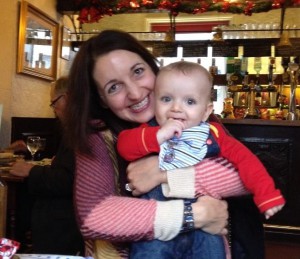 My child, I want to say this to you: It’s alright that you need me.
My child, I want to say this to you: It’s alright that you need me.
Needing is good. Needing is natural. When you cry for me, when you wrap your arms around me, when you sigh because you feel happy in my arms…you’re behaving just as you should. You are finding out where you fit in this world, discovering all there is around you and learning how to feel safe.
You are young and new and so many things at the same time: brave and unsure, loud and quiet, shy and confident, content and needy. You are all of these things, and that is alright.
I have worried before. We spend a lot of time together, which is lovely for me and, I hope, for you, too. But I sometimes have thoughts like, Will you struggle to settle without me? and Should you be more self-assured?
Then I remember, you have your whole life to be bold and independent. And what a big life you will have.
I want to reclaim need and dependence as good things. I want to remind everybody that these are qualities, not inadequacies. These natural urges ensure protection, security, safety. They are a big part of love and trust: You trust me enough to depend on me, to allow me to see your need.
It is alright to need people. It is alright to rely on them. It is alright to know that there are people in your world that will stand by you, on whom you can depend. In fact, it is more than alright — it is wonderful.
And you my little boy — in your own time — will take tentative, then hurried, steps away from me. You will let go. Then I’m quite sure I will wonder why I ever worried that you needed me so much, and I’ll miss those arms around my legs as I try to make dinner, those soft snores on my pillow that leave no room for my head, and those contented sighs as I scoop you up and make everything alright with a kiss.
I’ll miss the days when just being me, being with you, was all you needed.
It isn’t always easy to be needed, especially in the early and intense days when only I would do so much of the time. But I know also that it is a gift to hold such a big space in your heart. You trust that I will be there, that I won’t let you down, that I love you wholly — and to you, that is everything. You and I are everything, and everything is enough.
So need me, call me, demand me, exhaust me. And then smile — and I’ll be there for it all — every day.
And of course I will cheer you on, as almost each day it seems you need to do more things by yourself: take off your shoe, undo your zipper, brush your teeth. You are so proud! You need this, too, and I will never stand in your way. But for the times you need me, be it a hug between plays or holding on tight as we navigate something new, I will be here. To give you what you need, for as long
as you need it.
As your world gets bigger, I won’t be able to provide everything that you need, but for now, I can — and that makes me very privileged. So keep on keeping on, and I will, too — watching you lean, then lead, then leave.
So remember, it’s alright that you need me, and whether you know it or not, little one…I need you, too.




 Register for this call to hear hosts Lu Hanessian and Lysa Parker talk with Elizabeth Pantley about:
Register for this call to hear hosts Lu Hanessian and Lysa Parker talk with Elizabeth Pantley about: I slipped into the apartment at 5 pm, kicked off my sandals, and looked around. “Where’s the baby?” I asked my husband.
I slipped into the apartment at 5 pm, kicked off my sandals, and looked around. “Where’s the baby?” I asked my husband.